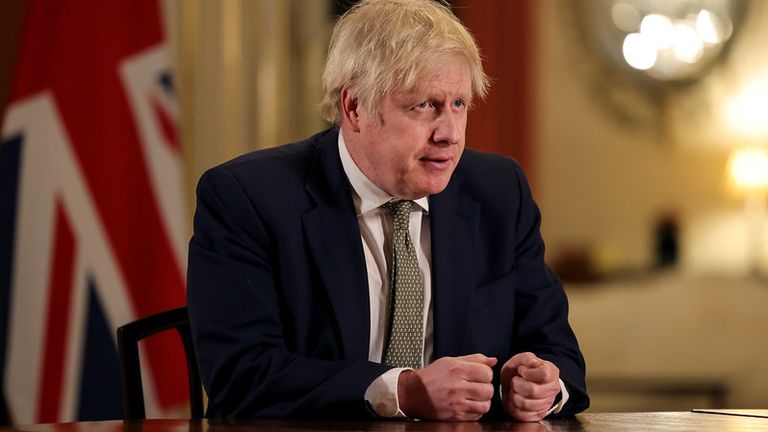More than 100,000 people in the UK have died after catching coronavirus, as the toll of a second wave sweeping across the country continues to be felt.
A further 1,631 people were reported to have died within 28 days of testing positive for COVID-19 on Tuesday, taking the total number to 100,162 since the start of the pandemic.
The government figures were released after the Office for National Statistics (ONS) - which uses a different counting method - this morning said the number had already passed 100,000.
Another 20,089 people tested positive for the virus on Tuesday, which is the lowest daily rise in cases so far this year.
On 11 November 2020, the UK had recorded 50,000 deaths with COVID-19. It has taken just 76 days for that figure to double.
Live coronavirus updates from the UK and around the world
Health Secretary Matt Hancock described the figures as "heartbreaking", adding: "My thoughts are with each and every person who has lost a loved one - behind these heartbreaking figures are friends, families and neighbours.
"I know how hard the last year has been, but I also know how strong the British public's determination is and how much we have all pulled together to get through this."
Dr Yvonne Doyle, medical director at Public Health England said it was a "sobering moment in the pandemic", but that "we should be encouraged that hundreds of thousands of people are receiving a vaccine every day".
Almost all of the UK is currently in lockdown to prevent the NHS being overwhelmed - nearly a year since the first official case of coronavirus community transmission was discovered.
Two people in York were found on 31 January 2020 to have the disease, about which little was known publicly apart from that it originated in Wuhan, China.
But that was just the beginning of a slow growth in officially-recognised infections as testing capacity battled to match demand.
On 17 March, the government's chief scientific adviser Sir Patrick Vallance said keeping the number of deaths under 20,000 would be a "good outcome".
There were unprecedented interventions as people were told to "stay at home", the Queen issued a rare national address and Prime Minister Boris Johnson warned: "Many more families are going to lose loved ones before their time."
But questions were already being asked about whether lockdown had come too late.
Mass gatherings, including a Stereophonics concert, the Cheltenham Festival and a Liverpool versus Atletico football game held on Merseyside, all prompted concern about how the virus spread so quickly.
And it was revealed Mr Johnson missed five meetings of COBRA - the government's emergency response committee - before March.
In the weeks ahead, the UK hit its first peak of daily deaths - 1,073 - on 8 April and then cases - 4,825 - on 21 April, with the prime minister himself catching the virus and being treated in intensive care.
Reports of personal protective equipment shortages also broke out, with health workers warning they did not have adequate equipment to treat patients - particularly in care homes.
And the prime minister's top adviser Dominic Cummings was found to have potentially breached lockdown rules after travelling to his parents' farm in Durham with his wife and young child - and then driving to Barnard Castle to apparently test his eyesight.
In the summer, "travel corridors" were introduced to force anyone arriving in the UK to quarantine, unless they came from a list of exempt countries.
Face coverings also started to be required in some public places, and Mr Johnson told people working from home they should start going back to the office.
Then as autumn arrived, cases began shooting up again - rising above 2,000 a day on 1 September for the first time since May.
What was once a national approach began to fragment, with the creation of tiers and different nations in the UK taking different approaches - Wales notably entering a "firebreak" while Mr Johnson was defying calls for similar action in England.
But he then decided to order a second national lockdown for November, which saw a dip in cases and deaths that quickly reversed as soon as it lifted.
Hopes for a vaccine were boosted with the medicines regulatory approving first the Pfizer/ BioNTech jab, then the Oxford University/ AstraZeneca one, and finally Moderna.
But when new year arrived, all four nations of the UK ordered another lockdown. Uncertainty remains over how long it will last.
https://news.google.com/__i/rss/rd/articles/CBMiY2h0dHBzOi8vbmV3cy5za3kuY29tL3N0b3J5L2NvdmlkLTE5LW92ZXItMTAwLTAwMC1jb3JvbmF2aXJ1cy1yZWxhdGVkLWRlYXRocy1yZWNvcmRlZC1pbi11ay0xMjE5OTE5N9IBZ2h0dHBzOi8vbmV3cy5za3kuY29tL3N0b3J5L2FtcC9jb3ZpZC0xOS1vdmVyLTEwMC0wMDAtY29yb25hdmlydXMtcmVsYXRlZC1kZWF0aHMtcmVjb3JkZWQtaW4tdWstMTIxOTkxOTc?oc=5
2021-01-26 16:52:30Z
52781331068163

Tidak ada komentar:
Posting Komentar